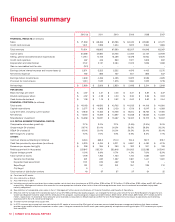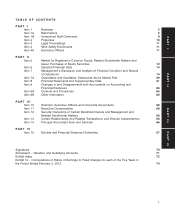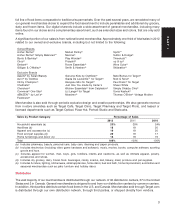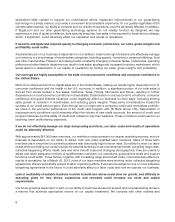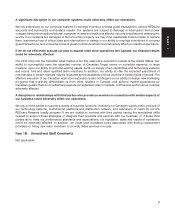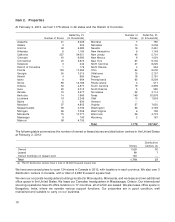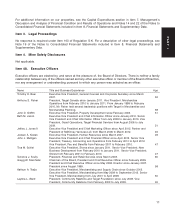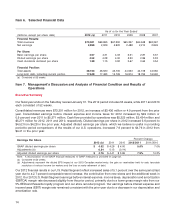Target 2012 Annual Report Download - page 24
Download and view the complete annual report
Please find page 24 of the 2012 Target annual report below. You can navigate through the pages in the report by either clicking on the pages listed below, or by using the keyword search tool below to find specific information within the annual report.Our failure to comply with federal, state or local laws, or changes in these laws could increase our costs,
reduce our margins and lower our sales.
Our business is subject to a wide array of laws and regulations. Significant legislative changes that affect our
relationship with our workforce could increase our expenses and adversely affect our operations. Examples of
possible legislative changes affecting our relationship with our workforce include changes to an employer’s
obligation to recognize collective bargaining units, the process by which collective bargaining agreements are
negotiated or imposed, minimum wage requirements, and health care mandates. In addition, changes in the
regulatory environment regarding topics such as banking and consumer credit, Medicare reimbursements, privacy
and information security, product safety, supply chain transparency or environmental protection, among others,
could cause our expenses to increase without an ability to pass through any increased expenses through higher
prices. In addition, if we fail to comply with applicable laws and regulations, particularly wage and hour laws, we
could be subject to legal risk, including government enforcement action and class action civil litigation, which could
adversely affect our results of operations by increasing our costs, reducing our margins and lowering our sales.
Weather conditions where our stores are located may impact consumer shopping patterns, which alone or
together with natural disasters, particularly in areas where our sales are concentrated, could adversely
affect our results of operations.
Uncharacteristic or significant weather conditions can affect consumer shopping patterns, particularly in apparel
and seasonal items, which could lead to lost sales or greater than expected markdowns and adversely affect our
short-term results of operations. In addition, our three largest states, by total sales, are California, Texas and Florida,
areas where hurricanes and earthquakes are more prevalent. Natural disasters in those states or in other areas
where our sales are concentrated could result in significant physical damage to or closure of one or more of our
stores or distribution centers, and cause delays in the distribution of merchandise from our vendors to our
distribution centers and stores, which could adversely affect our results of operations by increasing our costs and
lowering our sales.
Changes in our effective income tax rate could adversely affect our profitability and results of operations.
Our effective income tax rate is influenced by a number of factors, including changes in tax law, tax treaties,
interpretation of existing laws, and our ability to sustain our reporting positions on examination. Changes in any of
those factors could change our effective tax rate, which could adversely affect our profitability and results of
operations. In addition, the expansion of our retail store operations outside of the United States may cause greater
volatility in our effective tax rate.
If we are unable to access the capital markets or obtain bank credit, our financial position, growth plans,
liquidity and results of operations could suffer.
We are dependent on a stable, liquid and well-functioning financial system to fund our operations and growth plans.
In particular, we have historically relied on the public debt markets to raise capital for new store development and
other capital expenditures and the commercial paper market and bank credit facilities to fund seasonal needs for
working capital. Our continued access to these markets depends on multiple factors including the condition of debt
capital markets, our operating performance and maintaining strong debt ratings. If our credit ratings were lowered,
our ability to access the debt markets, our cost of funds and other terms for new debt issuances could be adversely
impacted. Each of the credit rating agencies reviews its rating periodically, and there is no guarantee our current
credit rating will remain the same. In addition, we use a variety of derivative products to manage our exposure to
market risk, principally interest rate and equity price fluctuations. Disruptions or turmoil in the financial markets
could reduce our ability to meet our capital requirements or fund our working capital needs, and lead to losses on
derivative positions resulting from counterparty failures, which could adversely affect our financial position and
results of operations.
8


